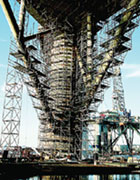 |
|
Tight Fit. Scaffold firms are consolidating. (Photo courtesy of Brand Services Inc.) |
The barriers for firms that erect scaffolding are getting higher in a business often weighed down with inventory, debt and liability. But private investors are attracted to the high cash flow and local brand recognition.
"The scaffold industry is doing very well," says Howard Schapira, president of Action Scaffold Manufacturing Co., Phoenix. Operators are prospering from a strong demand for access equipment while confronting growing restraints, such as transportation, labor, engineering and material costs. Firms looking to economize are getting acquisitive.
Managers at Waco Scaffolding & Equipment Co. recently bought the $80-million-a-year unit from a South Africa based parent firm. The independence helps Cleveland-based Waco respond faster. It just opened a "lay-down" yard in Las Vegas, and Waco later plans to make it a full-blown rental center. "We think that there are some exciting times coming for us," says CEO Marty Coughlin.
In early August, Safway Services Inc., a unit of ThyssenKrupp AG, bought 12 scaffold stores from U.K.-owned Sunbelt Rentals. The deal is in line with Safways plans to expand, "especially in the Western U.S.," says COO Jerry Johns.
One operators executive team is looking to grow internationally. Paul Wood, a metallurgical engineer and former manager for General Electric Co., in January climbed into the CEOs chair at Brand Services Inc. On July 29, the St. Louis-based supplier closed its purchase of Aluma Enterprises Inc., a scaffold and formwork supplier in Toronto.
The deal helps Brand reach luxury high-rise projects in Dubai and oil exploration in Canada. "A refinery in Alberta is double in size what [a] refinery would be in the U.S., which means twice as much work for us," says Wood.
Brand is owned by New York City-based JPMorgan Partners. Its purchase should push annual sales well above $500 million. The combined firm now employs about 6,500 craftworkers and owns $400 million in equipment, including more than 1,000 trucks.
Schapira says the scaffold business is due for more roll-ups. For the past two years, firms upped annual revenues by at least 10%. "With [Hurricane] Katrina, we may exceed that," Coughlin says.

Post a comment to this article
Report Abusive Comment